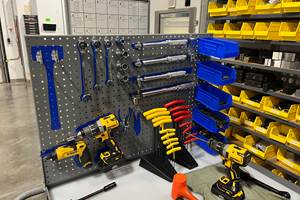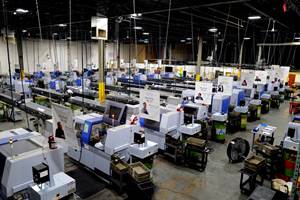“More than machine tools” is what exhibitors from all over the world will be showcasing at the EMO Hannover 2011. This is not an advertising agency’s slogan; it’s something that Prof. Dr.-Ing. Gunther Reinhart of Munich Technical University proves every day: as the Director of the Institute for Machine Tools and Industrial Management (iwb) brings real machine tools into the virtual world of simulation, algorithms and neural networks.
“The machine tool is a particularly ideal choice for practising cognitive issues,” explains Prof. Reinhart. “Nowadays, you see, it runs highly complex operations.” These involve firstly technology integration (for example, laser machining and grinding in a single machine), which can be mastered and operated by staff only with the aid of computers, and secondly automatic handling operations that are susceptible to malfunctions and errors. Sensor networks can act as a preventive here, and computer programs (known as algorithms) can help in the event of malfunctions.
CoTeSys: detect, deduce, deliver
Artificial intelligence, sensor networks and algorithms: no doubt about it, the world of machine tools is turning virtual. For this purpose, research is ongoing within the framework of CoTeSys (Cognition for Technical Systems), an excellence cluster for developing cognitive technical systems, subsidised by the German Research Association. CoTeSys’s remit includes incorporating artificial intelligence and fuzzy logic into the production machines. “We aim to use the tripartite requirement of “detect, deduce, deliver” to make machines more proactively autonomous than they used to be,” says Prof. Reinhart. Nowadays, production lines are programmed to take some decisions; a network of sensors is now tasked with enabling the machines to obtain information about itself and its surroundings, so as to formulate possible solutions autonomously with the aid of knowledge databases, and translate them into appropriate action. To quote Prof. Reinhart: “For each solutional approach, we check whether it is able to meet the tripartite requirement:” “detect, deduce, deliver.” This is not mere ivory-tower research: the “Cognitive Machine Shop (CogMaSh)” subproject has in Munich already created the first cognitive factory that thinks for itself—further facilities are under construction.
Internet of things: when workpieces can communicate...
One aspect of CogMaSh is the “internet of things”: for this purpose, workpieces are fitted with radio labels, known as RFID tags. For example, a component asks Machine Tool Number Two: “Can you drill a diameter of 50 millimetres on time, or shall I take myself to another machine?” The machine tool says “Yes,” the workpiece concerned uses RFID to book itself a “factory taxi,” and says to the driverless transport system: “Please take me to Machine Number Two.” After drilling has been completed, the workpiece stores information on its status, and the machining quality on its RFID tag.
The researchers at the iwb in Munich are also investigating the possibilities of virtual commissioning: they have succeeded in imaging a machine’s physical characteristics, like density, center of gravity, static and sliding friction coefficients, thus eliminating a defect of a CAD system’s previous geometric data, not based on the fundamental laws of physics. “You then see a components hovering after a gripper has released it, although actually it ought to fall to the ground,” explains Prof. Reinhart. “We’re now incorporating proper physics into the systems.”
Simulation: real-time is crucial
Complex situations are also programmed into the electronic data processing system: these, says Prof. Reinhart, also include the simulation of sophisticated machining centers with several control systems, which communicate with each other via a data bus. A manufacturer could use the simulation capability to virtually commission all of a factory’s production lines, test the software and the interaction of the machines, and simulate the reaction to artificially induced malfunctions. The difficult task involved here is primarily performing the simulation in real-time.
To ensure that development work keeps closely in touch with practical considerations, the scientist and his team work fruitfully together with the VDW (German Machine Tool Builders’ Association) and member companies like Deckel Maho Pfronten GmbH, Gebr. Heller Maschinenfabrik GmbH in Nürtingen and Liebherr-Verzahntechnik GmbH in Kempten. The scientists adopt a twin-track approach to the search for new ideas. “We get a lot of useful input from the Internet with its specialised forums and virtual trade fairs like the VDW’s CNC Arena,” reports the expert on virtual reality. “But we also send our scientists to the EMO Hannover so that they can get on-the-spot answers to their questions from machine tool manufacturers and users.”
The challenge: documents from disparate disciplines under one virtual roof
The first practical test for virtual commissioning, however, came not in the field of metalworking, but in beverage bottling. “This involved virtual commissioning of a multi-control-system model”, says Prof. Reinhart. “The complexity of this line can easily be transferred to machine tools as well.”
At the moment, however, the machine tool manufacturers are more interested in how documents created in different specialised disciplines can be brought together. So the task involved is to unite CAD depictions of machinery construction, electrical schematics, flow charts and programs from the software department under one virtual roof. “With a virtual model, it would then be possible, for instance, to create software automatically using the logic from electrical schematics”, says Prof. Reinhart with a view to the future.
The research people in Munich, however, simulate not only the technical side of a factory, but the financial considerations as well. They have created a model, for instance, that assesses the risks for the entrepreneur involved. The iwb trialled the system for an automotive component supplier, who was faced with a decision about building a plant in the Czech Republic or Bulgaria. “We calculated the possible spreads for the capital values of these investment projects,” explains Prof. Reinhart. “This covered the logistics chain, the dependability of supply, and, of course, developments in wages, which under certain circumstances may soar by up to 500 per cent. You soon realise that in the long term an investment abroad is not always going to pay off.”
About iwb
With a staff of 110, the Institute for Machine Tools and Industrial Management (iwb) at Munich Technical University ranks among Germany’s major research institutes for production technology. It comprises two chairs in the Mechanical Engineering Faculty at Garching near Munich and a production technology user center in Augsburg. The two chairs, one for industrial management and assembly engineering and one for machine tools and production technology, define the iwb’s keynote specialties. They range from production technology, machine tools, assembly engineering, joining technology, automation and robotics all the way through to production management and logistics.
About EMO Hannover 2011
From September 19 to 24, 2011, international manufacturers of production technology will be presenting “more than machine tools”, at EMO Hannover. The world’s premier trade fair for the metalworking sector will be showcasing the entire bandwidth of modern-day metalworking technology, the heart of every industrial production operation. It will be exhibiting the very latest machines, plus efficient technical solutions, product-supportive services, sustainability in the production process, and much, much more. EMO’s principal focus is on cutting and forming machine tools, production systems, high-precision tools, automated material flows, computer technology, industrial electronics and accessories. The trade visitors to EMO come from all major industrial sectors, like machinery and plant construction, the automotive industry and its component suppliers, aerospace technologies, precision mechanics and optics, shipbuilding, medical technology, tool and mould building, steel and lightweight engineering. EMO Hannover is the most important and most international meeting point for production technology anywhere in the world. The last EMO Hannover fair in 2007 was the venue for 2,120 exhibitors on approximately 180,200 m² of net exhibition floor space, attracting more than 166,500 trade visitors from 80 different countries.














































.jpg;maxWidth=300;quality=90)











